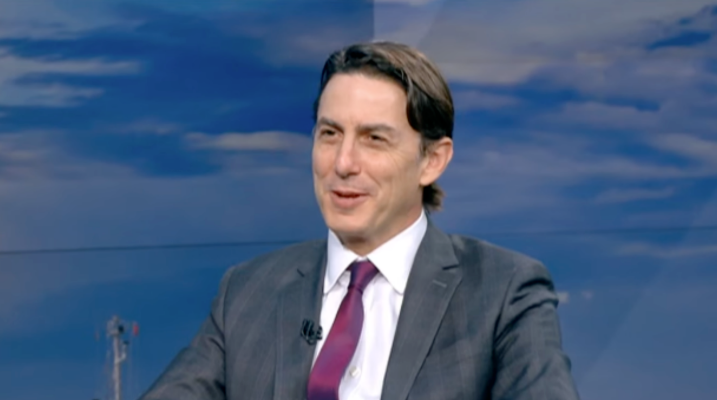While waiting for the return of U.S. mediator Amos Hochstein with the Israeli response to the proposed Lebanese amendment to his zigzagging line presented on February 8, various interpretations of the upcoming phase are emerging. No one has been informed about the timelines governing his next actions, and he hopes to receive expected reactions, leaving the door open to multiple scenarios.
Before reviewing potential scenarios that Lebanese officials hope for since Hochstein concluded his visit to Beirut last Tuesday, observers noted the absence of any personal statements from him or any other U.S. entity illuminating the upcoming stages, including the roadmap he will follow to complete his mission. For the first time in such a significant visit by an envoy of this level, the U.S. embassy did not issue any statement summarizing the outcomes; it seemed to rely solely on his comments to U.S. media.
Furthermore, it later became evident that none of the Lebanese officials who met Hochstein had precise information regarding his future approach as a facilitative mediator or how he would seek the Israeli response to the Lebanese proposals, aside from his mention of a maximum timeframe of ten days or two weeks. President Michel Aoun wished for a swift response, emphasizing the delicate stage where any potential security incidents could affect peace and security in Lebanon and the region.
Based on these considerations, the interpretations regarding the upcoming phase have expanded, yet no one can decisively determine what to expect, especially concerning the resumption of indirect negotiations that have been stalled since May 5 of last year after his predecessor, John Durand-Roche, froze them before focusing on his new role as the ambassador to Qatar.
Aside from information about his next destination, which remained exclusive to the security references accompanying Hochstein to the airport's VIP lounge, some claim he went directly back to his country, while others discussed a visit to another location before his return. The urgent mission he accomplished in Beirut intersected with several tasks he undertakes in his capacity as one of the major officials overseeing global energy security, aimed at addressing the significant repercussions caused by the Russian invasion of Ukraine and the steps that could be taken to ensure that several U.S. allies can access energy sources to compensate for the shortfall resulting from sanctions on Russia.
Before being compelled to respond to Lebanon's urgent invitation for the visit, Hochstein was occupied with addressing crises stemming from the Russian initiative that retaliated against its production boycott decisions by halting gas exports unilaterally to several European nations within its geographical vicinity and in contact with the ongoing confrontation with Ukraine, after it extensively supported the Ukrainian government militarily and financially or threatened further sanctions that led to Moscow's exclusion from many international clubs and UN institutions, including cultural and sports events. This exclusion has been so severe that Foreign Minister Sergey Lavrov had to cancel some external visits after his neighboring countries closed their airspace to his plane.
Beyond these fundamental observations, some believe that the outcomes of Hochstein's visit to Beirut were significant to the extent that the mere leak of the proposed maps from the Lebanese side rendered them non-secret. Consequently, it is presumed that Israel has begun discussing and analyzing the Lebanese position, which presented no surprising or strange data to those engaged in this file from the outset, covering all scientific and technical dimensions related to maritime borders, and its response will be available soon, if it is not already prepared. Everyone recognizes that Tel Aviv does not require internal consultations, as the decision lies in one place, demonstrated by the fact that any U.S. or foreign envoy does not need to conduct shuttle diplomacy in Tel Aviv, unlike those between government, political, security, and diplomatic institutions in Beirut.
Based on the provided data, some are anticipating the critical phase between Hochstein's departure from Beirut and his upcoming visit to Israel, signaling the start of shuttle tours if he decides to conduct them between Beirut and Tel Aviv, a possibility many currently deem unlikely. Proponents of this theory rely on information suggesting that what has been accomplished may lead to a new status quo. Therefore, if Hochstein does not make a quick visit to Israel, it could indicate a new strategy that will be adopted after ensuring mutual commitments to refrain from any military actions. This would allow him to introduce a new theory suggesting the freezing of operations from both the Lebanese and Israeli sides in the disputed area between lines 23 and 29 — despite the absence of widespread acknowledgment of the latter — until negotiations in Naqoura are revitalized.
Accordingly, for observers well-informed about ongoing regional events and preparations to market Egyptian and Israeli gas in Europe as the closest and least costly alternatives to Russian gas, Lebanon must await the results of U.S. President Joe Biden's visit to Israel and Saudi Arabia to explore the future and cost of energy. If Riyadh responds positively to Washington’s demands to increase its production before the end of next summer, global prices will decline, and the quantities needed to cover shortages will be available, thereby allowing the re-engagement with the border delineation file.
Therefore, one expert summarized the scenario following Hochstein's visit, stating: "Regardless of the Israeli response, any understanding regarding the extent of the disputed area may allow Lebanon to resume exploration in any non-contested area, provided that 'Energin Power' continues its operations as long as they work outside the disputed region. Hence, extending the Energy Minister's deadline for submitting applications for participation in the second licensing round to December 15, 2022, may offer Lebanon a missed opportunity to carry out explorations previously forbidden and not merely to create opportunities for additional companies currently not operating in Lebanese maritime waters to prepare their files and studies and participate in this round as announced. Consequently, Lebanon can begin its journey with gas wealth where it desires and in any block away from the disputed area."




